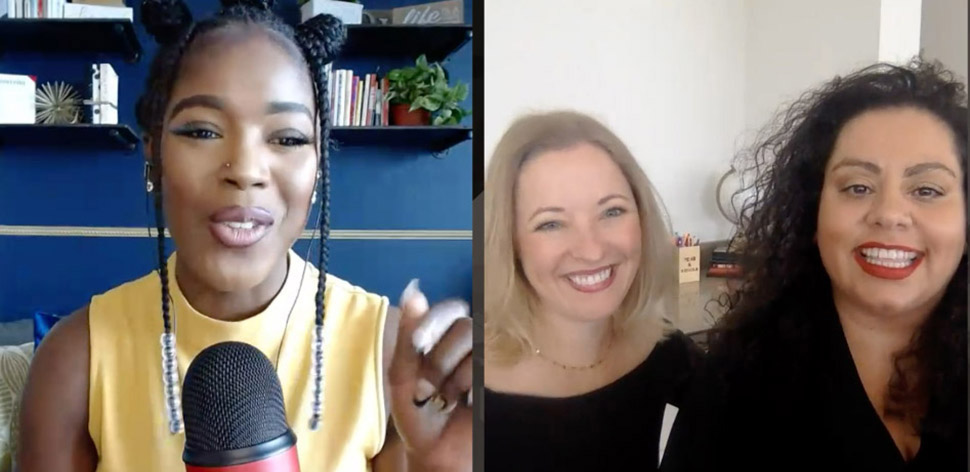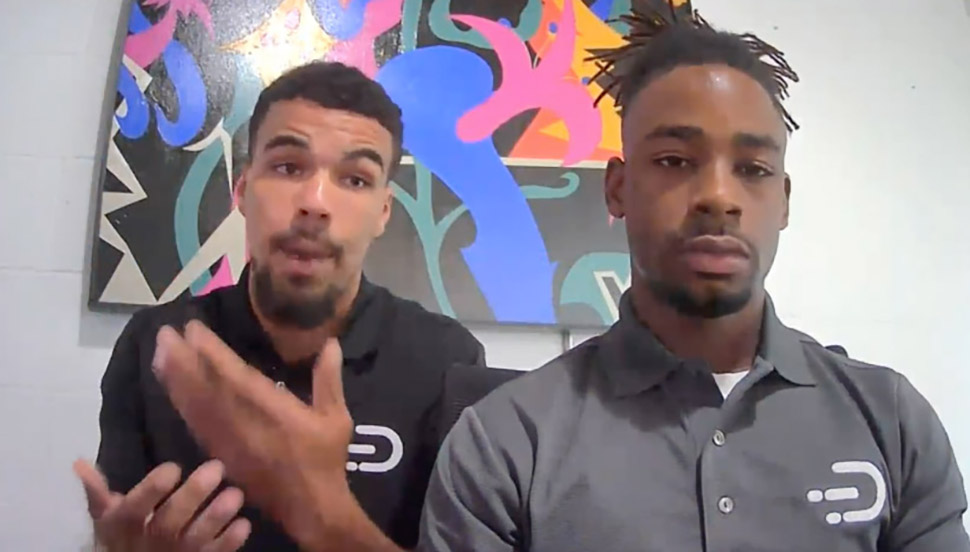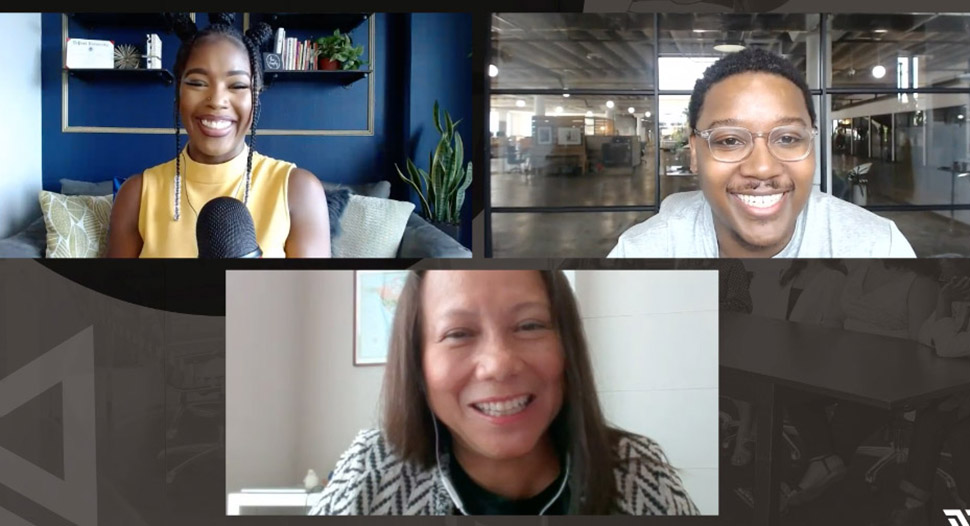Impact Ventures is a Dallas-based startup accelerator that’s best known for empowering women and communities of color by creating more diverse and inclusive ecosystems. To do so, the nonprofit boosts underestimated entrepreneurs through its cohort programs and tech career pathways. It also hosts a bi-annual flagship event that offers access to capital for founders who are often overlooked: The Startup Showcase.
Saturday’s live virtual event, titled “Equity in Motion,” hosted five startups from Impact Ventures’ Spring 2021 cohort.
Impact Ventures last week unveiled the top five startups chosen to move to Saturday’s final round and pitch—“Shark Tank” style—for a pool of $50,000. The fellows chosen were evaluated by IV’s internal team and its partners on their participation during the accelerator program, business viability, and their presentations. Each founder displayed their pre-recorded pitches at the “Equity in Motion” event, then participated in a live audience Q&A MC’d by WFAA’s Tashara Parker.
There was also networking, community partner expo booths, and featured breakout sessions led by experts at the event, which was sponsored by JPMorgan Chase, Jabian Consulting, and Capital One.

Church Space’s Day Edwards and her co-founder, Emmanuel Brown, took the top prize at the event for their “Airbnb of churches” concept.
The startups that took home the top prizes were Church Space ($25,000), Cyber Shield Security ($15,000), and Language Learning Market ($10,000).
The final two—Reyets and Concession Delivery—tied in votes for audience favorite.
“Investing in all shades of genius is truly something that is necessary, on a daily basis and we have to understand that as we continue to build our communities,” Parker said at the event. “These businesses are doing incredible work. I hope that other business owners that are here are inspired by what they’ve seen today. And future business owners maybe will take some of what they learned to start businesses that will continue to uplift our communities.”
If you weren’t able to tune in, here’s our quick rundown of the startups and their pitches—along with why they need funding.
Church Space

Day Edwards, left, and Emmanuel Brown
Co-Founders Day Edwards and Emmanuel Brown call Church Space the “Airbnb of churches.”
Statistics show that one in three church leaders are considering leaving the ministry due to financial distress, and one in five are facing the harsh reality of permanent closure within the next 18 months. But, on average, a church building sits empty 69 percent of the week—making churches one of the most underutilized, yet costly, pieces of real estate in the country.
That’s where Houston-based Church Space comes in. Edwards, who has experience as a church marketer and comes from a family of ministry leaders, saw a way for facilities to generate income on days when they weren’t being used.
Church Space’s online, mission-driven marketplace allows churches to rent their spaces as on-demand event, worship, or meeting sites. The tech has built-in features that protect churches both legally and financially, helping to mitigate the fear many have when dealing with large corporations or third-party companies.
And because it was created “for churches by churches,” the solution ultimately safeguards the church to ensure renters are compliant and pre-screened.
Last year, Church Space showed its proof of concept by launching its beta platform. It now has more than 3,200 registered users—helping churches earn an extra minimum $23,000 per year—and plans to accelerate that momentum as COVID restrictions continue to lift.
Cybershield Security

Torrence Reed
Washington-based Cybershield Security is a software and services solution that assists customers in protecting their assets reputation and information.
To Torrence Reed, a main problem that businesses have is that their reputation and bottom line are under attack—”every day, every moment.” Most use multiple systems for their operations, and hackers know this. “They also know that this creates an interconnected mess of gaps,” Reed says, “and where there’s gaps, there’s noncompliance.”
Cybershield Security removes the complexity from IT security compliance to save business owners on their overall costs. The early stage SaaS platform provides customers with protection for their assets and reputation by placing an emphasis on data.
The team, which has more than 45 years of cybersecurity experience, connects their systems to a customer’s systems and scans for any at-risk vulnerabilities. Armed with that information, they create a step-by-step security roadmap to remove any gaps. They then set up continuous monitoring and proactive alerts that utilize a customer’s data.
Cybershield Security will use its funding to continue building out its proprietary scanner and IP activities.

Cybershield’s Torrence Reed celebrates his win at the virtual event.
“You won’t find a better team to build a cyber system. The best cybersecurity plan is educated individuals,” Reed said. “It takes one click to destroy your business’s reputation. Join us in our mission of automating IT security compliance.”
Language Learning Market

MC Tashara Parker moderated a Q&A with the language entrepreneurs.
When Allison Monroe gave birth to her oldest daughter, she immediately wanted to teach her Arabic. Monroe had lived and worked across the world, and started searching across the Middle East for engaging resources she could buy. She discovered an assortment of incredible small businesses with beautiful products—but she quickly realized they had no distribution model.
That led Monroe to found an Arabic educational distribution company in 2007, in which she took dozens of companies global and digital. Now she and her co-founder, Hiba Hamati, are taking that one step further by scaling her McKinney-based company from one language to 7,000 via a multi-vendor marketplace for buyers and sellers: The Language Learning Market.
The company aims to assist parents and educators in finding curated language learning resources and educational resources. It’s a global one-stop-shop, curated with puzzles, games, downloadable posters, worksheets, and more. The products are offered in multiple languages and hosted by global sellers.
That helps businesses abroad overcome the high barriers to global e-commerce entry, and allows them to place their products directly in front of nice audiences.

Language Learning Market won the $10,000 prize.
“We have a larger vision of creating this ecosystem that becomes the destination for all things language learning,” Hamati said during their pitch. “Each of these platforms has potential revenue streams that come through commissions on product sales subscription fees from premium seller plans and brand advertising opportunities. But for now, we’re focused on growing the marketplace, since it’s the cornerstone of our ecosystem.”
The woman-owned and minority-led EdTech marketplace and PaaS startup recently announced the expansion of its HQ with a grant from the McKinney Economic Development Corporation’s (MEDC) Innovation Fund. The startup connects learning resource buyers and sellers in 7,000 languages and dialects.
Concession Delivery

Concession Delivery, founded by Cody Davis and Kaymon Farmer, was an audience favorite.
As current and former high school educators and coaches, Cody Davis and Kaymon Farmer have witnessed schools lose thousands a night because customers had to choose between watching a game or grabbing food at the concession stand. Adding to the problem is the fact that 90 percent of high schools have no mobile point of sale procedures, meaning fans can’t pay with a debit or credit card and schools don’t have a way to digitally manage inventory.
That’s why Farmer founded Concession Delivery, a tech-enabled solution that helps booster clubs and school sports venues to earn more money in less time.
The web-based mobile application—no download required—allows fans to support their favorite teams while also ordering food or merchandise. The management system makes inventory tracking and order fulfillment quick and efficient: Attendees can scan a QR code at touchpoints on the way to, or at, their seat.
That opens the Concession Delivery app, where a fan can place an order for delivery or pickup. They can even make a donation to the team, all from the comfort of their bleacher seat.
This fall, the team is launching in 10 high schools with a goal of covering around 55 during their first year. They plan to focus on Dallas-Fort Worth, where they’ve already set up shop. In the future, they’ll use capital to create a digital campus store for schools to sell tickets, merch, supplies, and more to the community.
Reyets

Wa’il Ashshowwaf founded Reyets, a social justice network, which was another audience favorite.
Wa’il Ashshowwaf has launched various ventures, built an award-winning startup studio, and worked for top Fortune 500 companies. But he says his professional journey almost didn’t happen because 25 years ago, he was unlawfully arrested.
“The justice system that was supposed to protect my rights failed me,” Ashshowwaf said during his pitch. “And I didn’t know my rights.”
That led Ashshowwaf to found Reyets, which he calls “a social justice network unlike any other.” The smart app is powered by AI data analysis to protect civil rights, empower safer communities, and manage police interactions.
Built around a community of changemakers, Reyets is the antidote to injustice. Users are given a detailed description of their rights in easy-to-understand language that allows them to understand the implications of a situation. Then Reyets helps assert those rights by providing resources like alternatives to calling the police. Lastly, the app creates action campaigns that are powered by gamification incentives for users.
Reyets is provided at no cost to users, as they are the ones the team is trying to help. The startup generates revenue through affiliate marketing and partnerships for corporate assistance programs.
“The justice tech field is new,” Ashshowwaf said. “We’re pioneers in the space.”
Project Amplify Grants
Four companies from Impact Ventures’ Entrepreneur Accelerator Program track received Project Amplify Grant Awards from the accelerator’s partner, Jabian Consulting. The startups are: Fort Worth’s The Good Jerky ($15,000), which makes fish-based, health-conscious snacks; Le Rouge Cuisine ($5,000), a Dallas-based Creole focused catering and private event company; Milkspace ($2,500), a Garland breastfeeding products and e-commerce platform; and Dallas’ BCM Engineering Solutions ($500), a process improvement consulting service.
About the Impact Ventures accelerator

WFAA’s Tashara Parker, Impact Ventures CEO and Founder Ben Vann, and Impact Ventures Program Director Lucy Huang announced the winners—and what’s next for the accelerator at the event.
The Equity in Motion event was the second of the year following the virtual startup showcase in January. There, Dallas-based AlgoPear, an automated stock trading marketplace, took the top prize among 13 other startups and small businesses.
It’s a culmination of Impact Ventures’ latest accelerator program, which is supported by Communities Foundation of Texas’ W.W. Caruth, Jr. Fund, Capital One, Santander Foundation, Truist Foundation, and Deloitte.
With “Equity in Motion,” the nonprofit is furthering its mission of empowering talented yet underestimated women and communities of color to create generational wealth through inclusive entrepreneurship and integrated capital.
A group of women, Black, and Latinx-led startups and small businesses from North Texas and various parts of the country participate in the 12-week accelerator dedicated to assisting underrepresented communities looking to break into the tech industry. The 2021 cohort focused on three entrepreneur archetypes—Traditional Small Business Owners, Social Entrepreneurs, and Tech-Driven Entrepreneurs—with a specific aim to create a pipeline to Impact Ventures’ Dallas Inclusive Capital Fund.
The recently announced initiative has a goal to lend and invest $20 million to women- and BIPOC-led enterprises over the next 10 years. The place-based integrated capital fund invests flexible debt and patient equity to build economic power and generate community wealth.
This year’s accelerator, in addition to going completely virtual, also introduced a Local Enterprise Accelerator Program (LEAP) Track that has a place-based focus on traditional small business owners located in South and Southern Dallas and an Inclusive Innovation Program Track for high-growth tech or tech-enabled enterprises looking for a product market fit and/or seeking pre- and seed stage capital.
Impact Ventures’ programs are supported by a network of more than 70 mentors and a high-touch, high-impact model created by CEO Benjamin Vann. The nonprofit addresses the individual needs of each founder, deploying capital readiness assessments, milestone-driven growth plans, enterprise resources, and more.
“We’ve really built the program around the entrepreneurs’ needs,” Vann says. “For us, it’s about going deep with our founders and producing real outcomes that drive change in our communities.”
Impact Ventures recently received its largest gift to date, a three-year grant totaling $450K from the Communities Foundation of Texas’ W.W. Caruth, Jr. Fund. In addition to using the funding to grow its own program, Vann and his team are using it to help fund other entrepreneurs in the area.
Quincy Preston contributed to this report.
An earlier version of the story misidentified Church Space Co-Founder Emmanuel Brown as Daniel Brown. The report has been updated.
![]()
Get on the list.
Dallas Innovates, every day.
Sign up to keep your eye on what’s new and next in Dallas-Fort Worth, every day.






























